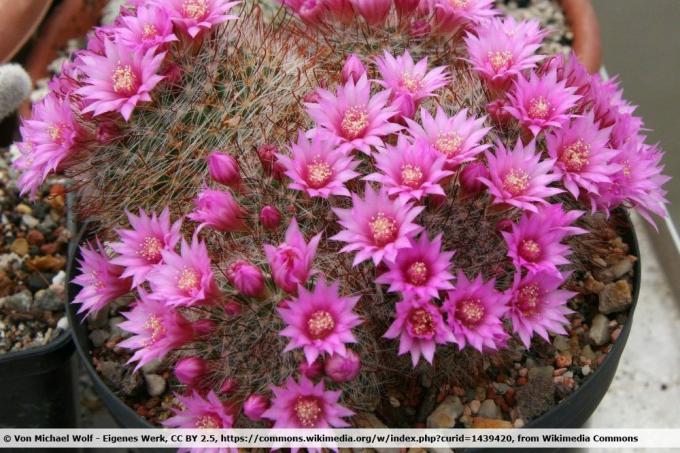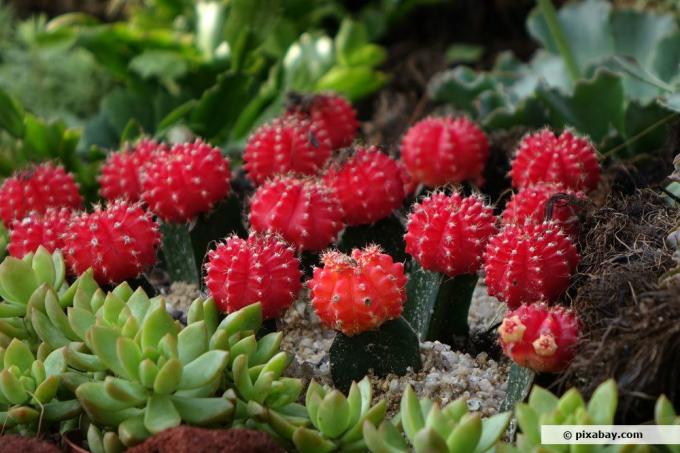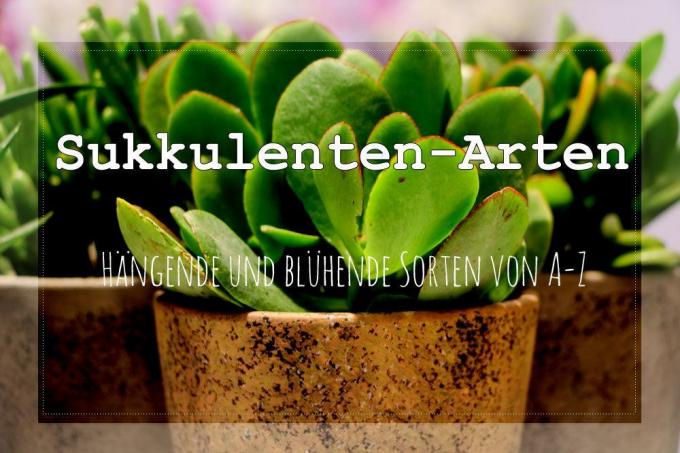
table of contents
- 30 species of flowering and hanging succulents
- Succulents from A - C
- Succulents from F - K
- Succulents from L - P
- Succulents with R
- Succulents with S
- Succulents with W
Due to their sap-rich leaves, succulents are extremely robust and are therefore popular with many plant enthusiasts. Easy to care for and in many cases undemanding, they are ideal for a wide variety of design options in your own apartment, terrace or balcony. Species that grow in bloom or pendulous are particularly popular with humans. If you are still looking for a suitable succulent plant, you will find a good overview here.
30 species of flowering and hanging succulents
The purchase of one or more succulent species for the home ambience or the garden is sometimes a bit confusing due to the great variety. In addition, a large part of the plants is not known to everyone, especially when it comes to the numerous varieties that hide behind a species. Many of the plants listed below are in bloom and some of these are even pendulous. The individual plants differ in the classic types of succulents:
- Leaf succulents
- Stem succulents
- Root succulents
Although there is only a single root succulent of the species and varieties listed below, the variety is extremely extensive. This is exactly what makes this type of plant so popular. The following list introduces you to 30 succulent plants that are either flowering, hanging, or both:
Succulents from A - C
Monkey tail
The monkey tail (bot. Cleistocactus colademononis) is a popular cactus, the shoots of which can reach lengths of 2.5 meters. They hang down and are completely covered with white spines. These are soft and can therefore be touched without any problems.

Afterglow
This Echeverie (bot. Echeveria 'Afterglow') is known for its flowers, which make it the prettiest of the entire genus. These have an elegant shape and a color that is reminiscent of lavender.

Begonias
Among the begonias (bot. Begonia) there are only a few species that are succulent. These include the wax begonia (bot. Begonia cucullata) and maple-leaved begonia (bot. Begonia dregei), which develop the typical flowers and leaves of the genus. If you have always been a fan of begonias, you should not miss these taxa and incorporate them into your collection. The maple-leaved one comes from Brazil, while the wax begonia comes from the forests of South Africa.

Leaf cacti
Leaf cacti (bot. Epiphyllum) are recommended for you as succulents because of their large selection of varieties and species.
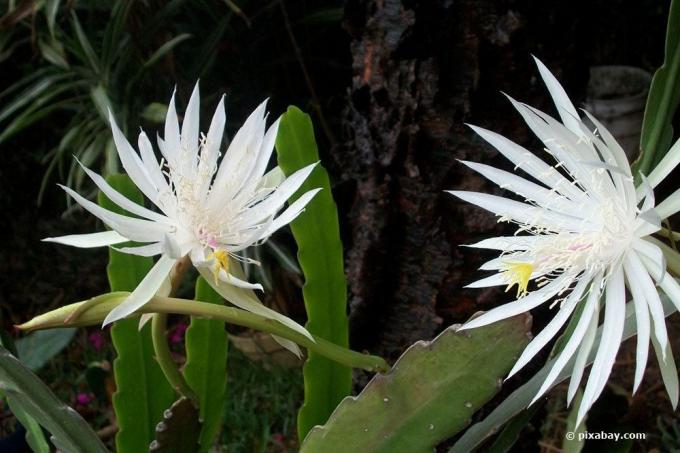
Calico kitten
The highlight of these pretty, hanging succulents with the botanical name Crassula pellucida subsp. marginalis 'Variegata' are the heart-shaped leaves. These are a mix of four different colors that differ from one example to another: green, pink, purple and cream-colored. The shoots also become darker or lighter depending on the location.

Christ thorn
The shape of these blooming succulents alone catches the eye immediately. The fleshy leaves with the rounded flowers are characteristic of this species in addition to the thorn-reinforced shoots. Due to the numerous varieties, Christ thorn (bot. Euphorbia milii) like to be kept on the balcony or the windowsill.
Succulents from F - K
Flaming Kathchen
The Flaming Käthchen (bot. Kalanchoe blossfeldiana) is a classic in Germany. The numerous varieties allow different combinations with regard to the design of your own window sill.

Money tree
The money tree (bot. Crassula ovata) is another classic known for its succulent leaves. With good care, it can reach a considerable size.

Hanging ragwort
The hanging ragwort (bot. Senecio herreianus) forms shoots with a length of up to 90 centimeters, which hang down and also have thickened leaves, but which are oval in shape. These look very elegant and are particularly attractive when hanging.
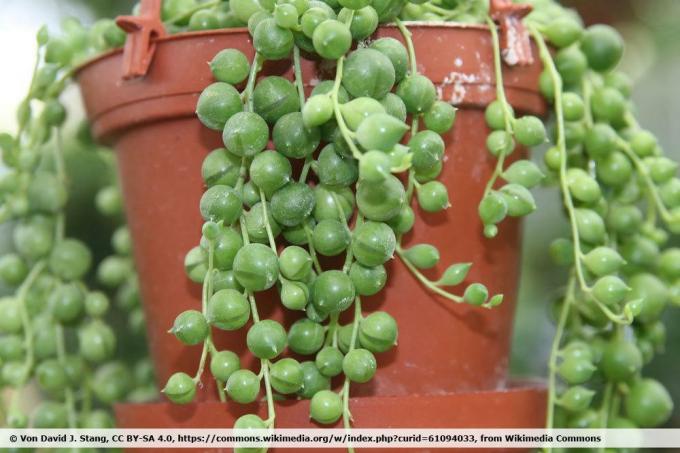
Hindu Rope Plant
The Hindu Rope (bot. Hoya compacta) comes from India and has waxy leaves that are held in the shape of a star. Particularly striking are the individual shoots, which can grow into thick ropes and are decorated with twisted leaves and pretty, white flowers.
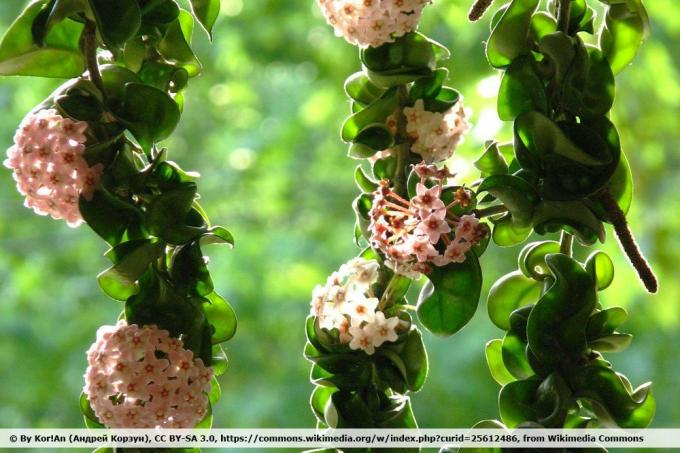
Kenya Hyacinth
With this one Bow hemp it is a succulent that is both flowering and hanging at the same time. The small, white-pink flowers are only slightly noticeable, but the more so are the leaves, which can reach a length of 45 centimeters and thus hang down. Don't be surprised: the Kenya Hyacinth (bot. Sansevieria parva) first grows upright.
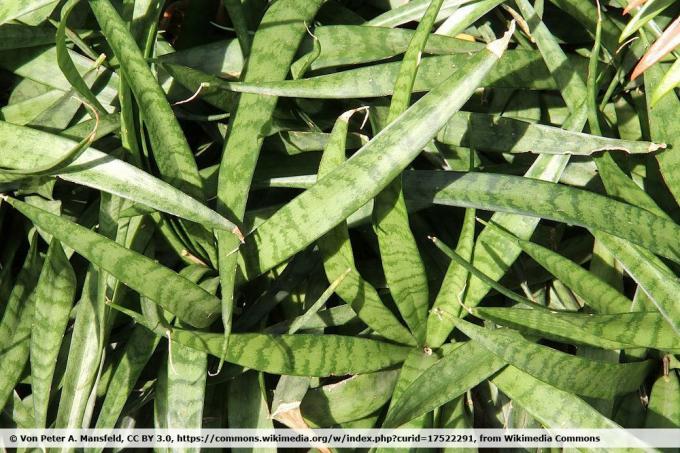
Small-flowered western aloe
An aloe that produces attractive flowers that are small and red and known by the botanical name Hesperaloe parviflora.
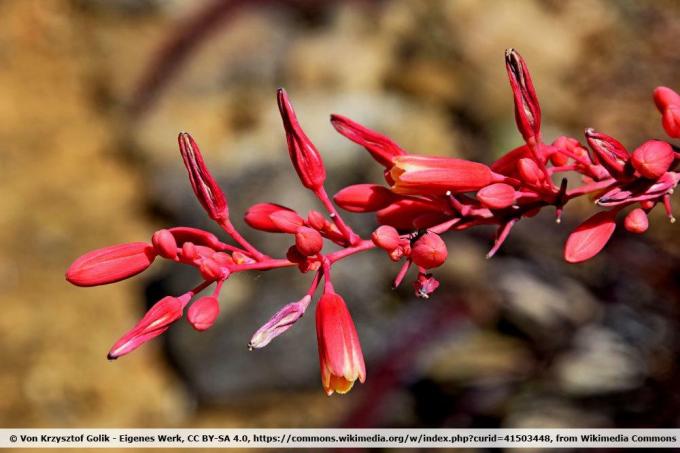
Succulents from L - P
Lifesaver Cactus
The Lifesaver Cactus (bot. Huernia zebrina) has star-shaped flowers that are provided with zebra stripes and have an almost hypnotic effect.

Little pickles
The daisy family Little Pickles (bot. Othonna capensis) is a species of the African genus Othonna that grows in a crawling manner and is therefore often used in hanging baskets. The fleshy shoots grow about 30 centimeters in length and have golden yellow flowers that blend in nicely with the ambience.

Marble buttons
Marble buttons (bot. Conophytum calculus) is a small plant, the leaves of which form round balls and have a smooth surface. The highlight happens during the flowering period, because the flowers only show up at night.

Peanut Cactus
As the name suggests, the shoots of this species are reminiscent of peanuts, which grow into long, hanging snakes with age. The orange-red flowers of the Peanut Cactus (bot. Echinopsis chamaecereus) sit between the shoots like in a bed.
Whip cactus
The whip cactus (bot. Disocactus flagelliformis) is a classic that grows pendulous and flowering. While the individual shoots can reach lengths of up to three meters after several years, it forms beautiful flowers in a pink hue that will definitely cast a spell over you very early on will.
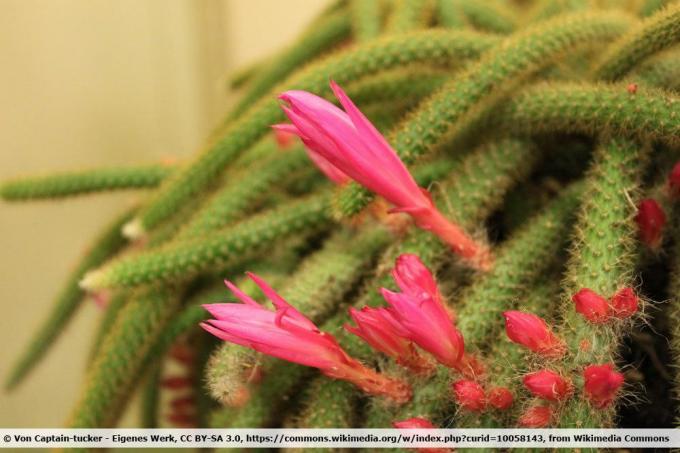
String of pearls
The string of pearls (bot. Senecio rowleyanus), like Ceropegia woodii, is ideally suited for a hanging position. The individual tendrils have numerous, pea-green and spherical leaves that are similar in shape to a pearl necklace. It is particularly easy to care for and therefore all the more popular.

Pincushion Cactus
This small, round cactus with its pretty flowers needs at least four hours of direct sunlight a day. Because in this way Pincushion Cactus (bot. Mammillaria crinita) with abundance of flowers and thorns.
Succulents with R
Smoke colored pelargonium
This beautiful blooming succulent with the botanical name Pelargonium luridum is available in several varieties and seduces with the shape of the picturesque flowers. Although the color of the flowers is paler, it catches the eye. At first glance it cannot be recognized as a succulent because it is a root succulent. Therefore, you will only notice the fleshy roots once you repot them.
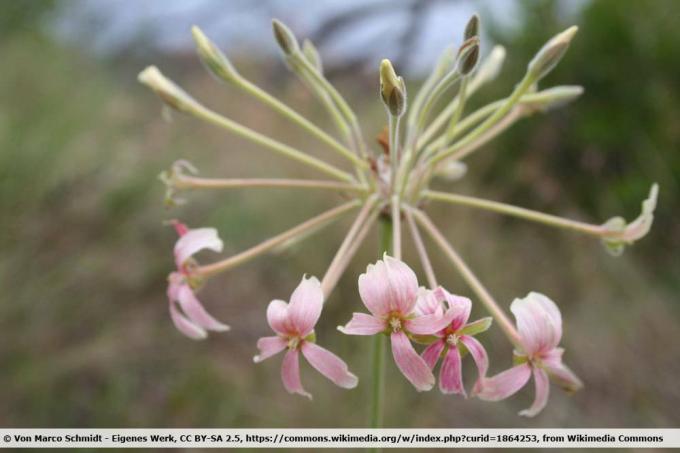
Rock purslane
The flowers of the rock purslane (bot. Calandrinia spectabilis) resemble small wild roses and bloom only for one day, but in large numbers. It forms dense succulent pillows in the garden.
Ruby Ball
Another type of cactus whose flowers are in the foreground is Ruby Ball (bot. Gymnocalycium mihanovichii). Because these grow directly on the tip of the cactus and shine in an intensely magnificent red.
Succulents with S
Columnar cacti
This genus (bot. Cereus) is ideal for you if you are looking for flowering succulents. The number of types and varieties is quite large, so you should take a little time to choose.
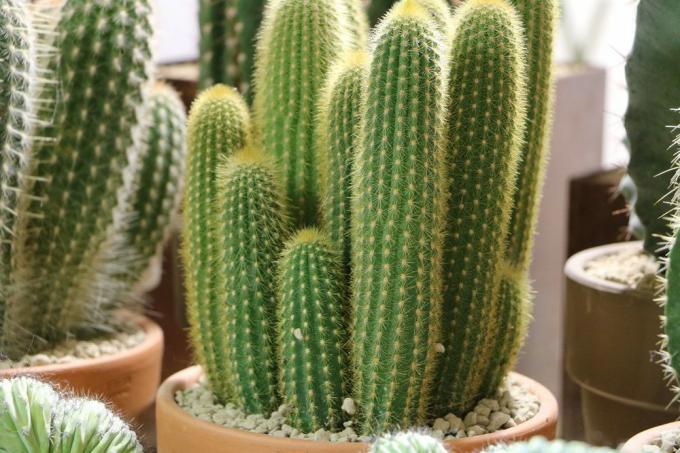
Snakes-Sedum plant
Species of the genus Sedum are known in Germany under the more common name stonecrop. The snake sedum (bot. Sedum morganianum) is called the monkey swing because of the shape of its pale, light-colored shoots clad in blue and gray-green. This species is extremely drought-resistant when it has established itself in its location and is provided with a well-drained substrate.
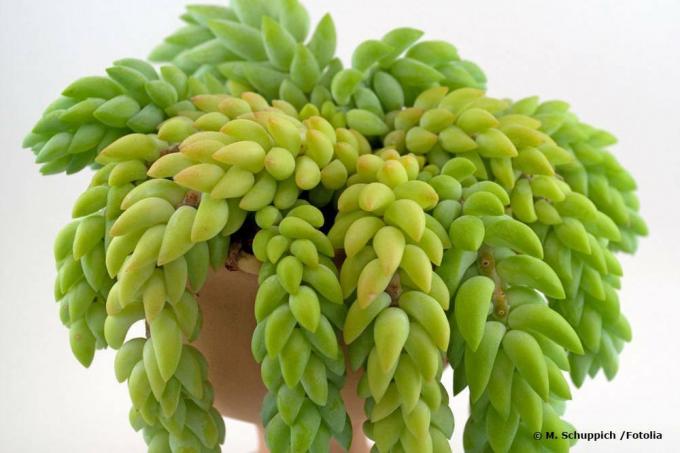
Cobweb houseleek
The cobweb houseleek (bot. Sempervivum arachnoideum) is a succulent plant that is popular for its round shape, persistence, and beautiful flowers.

Perennial ice plant
These midday flowers (bot. Delosperma cooperi) are a popular plant for the garden due to the fleshy leaves and the pretty, round flowers in different colors.

String of Hearts
String of Hearts (bot. Ceropegia linearis) is a dreamlike succulent that attracts attention with its light green leaves in the shape of a heart. The succulent tendrils grow up to four meters long and for this reason they are often held hanging so that they can fall down. Ceropegia woodii has unique flowers and the leaf color changes according to the supply of light.

String of nickels
String of Nickels (bot. Dischidia nummularia) is another succulent plant that has long stems that develop leaves in the shape and size of American nickel. The light, gray-green color immediately catches the eye and the plant forms an extremely large number of leaves, which intensifies the effect.
Succulents with W
Christmas cactus
The Christmas cacti (bot. Schlumbergera) are provided with hanging shoots, the green shade of which goes perfectly with the flowers that form the different varieties of the species. The color variations range from a lovely pink to red to a light purple.

Desert rose
The desert rose (bot. Adenium obesum) is one of the flowering succulents that develop numerous flowers. These are kept in pink or light red tones and thus stand out from the green of the other parts of the plant.
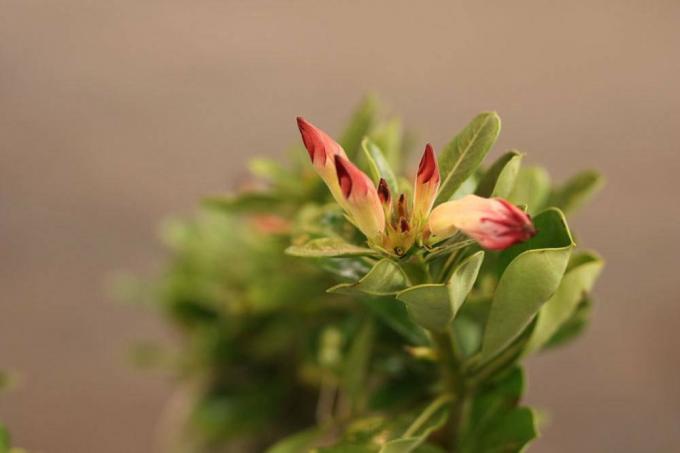
You are probably wondering why so many of the above succulents have an English name? Many of the hanging and flowering species and varieties come from non-European countries and for this reason often do not even have a German name. Therefore, you will find numerous English terms in the list above, which give an interesting insight into the thoughts of the respective cultures that have named the plant.
tip: Getting your succulents to bloom doesn't just depend on care and location. Succulent plants need a cold stimulus before blooming, which is extremely important as a trigger for this process.


